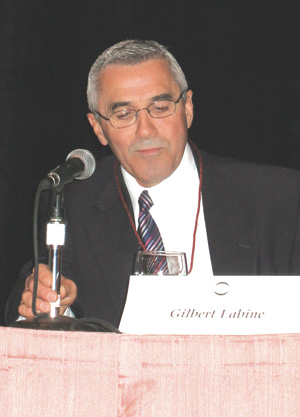
When seeking a conditional sentence for yourclient, it's important, say members of the defence bar, to take a principledapproach.
 "Keeping your client out of jail" was the topic
of just one of the seminars at the recent Criminal Lawyers Association's fall
conference, where members of the defence bar got together in
"Keeping your client out of jail" was the topic
of just one of the seminars at the recent Criminal Lawyers Association's fall
conference, where members of the defence bar got together in
"There has been, as you probably all are aware,
public pressure not only from police associations, special interest groups, and
certainly the media with an editorial in The Globe and Mail a couple of weeks
ago criticizing the judiciary for imposing conditional sentence orders," said
the chair of the panel, Thunder Bay, Ont., lawyer Gilbert Labine.
"So there's increasing pressure on judges not
to listen to our demands to impose these kinds of conditional sanctions."
This was witnessed most recently with the
conditional sentence handed down to Paul Coffin, the first person convicted for
his part in the federal sponsorship scandal. The
A Quebec Superior Court judge handed him a
community sentence of two years less a day last month, plus a weeknight curfew
of 9 p.m. Coffin has also repaid $1 million of the defrauded money and has
begun speaking to students at several universities on business ethics.
The sentence Coffin received was considered by
some to be too lenient. The Crown is appealing.
Justice Minister Irwin Cotler introduced
legislation last week that would restrict the use of conditional sentences for
all forms of sexual assault, organized crime, and any serious or violent
individual case where the need to condemn the act takes priority over other
sentencing objectives.
According to the Criminal Code, any
However, lawyers on the panel say you will have
a much harder time getting conditional sentences for certain offences than
others.
"With respect to grow operations, my experience
is that it depends largely on the size of the operation," said Lee Baig,
another
With respect to offences involving cocaine,
Baig said, defence will have a lot of trouble getting any consideration at all
for conditional sentences, unless it's a small amount and there are some
features about the tender that are very good. For example, the accused has a
job, a family to support, or an illness that requires constant attention.
"So far, for the harder drugs you're going to
have a lot of trouble," he said. "It's assumed that these drugs are going to
destroy the fabric of our society."
For offences involving fraud and breach of
trust, as in Coffin's case, it can also be tricky to seek a conditional
sentence.
First, said Brian Greenspan of Greenspan
Humphrey Lavine, greed-related crimes are one of the only areas where
incarceration seems to be an effective deterrent. Second, it's hard to convince
a judge or the public that the offender relaxing by a pool for a couple of
months, even under house arrest, is being punished.
"That's the type of area where you will see a
rejection, and when you see large-scale frauds of first offenders, people in
the business community who would otherwise under every other category qualify
for conditional sentencing," Greenspan said.
The breach of trust factor of large-scale fraud
is also an aggravating factor.
"There's no question that breach of trust is an
articulated aggravating factor, so you've got a codification of breach of trust
being an aggravated factor," Greenspan said. "Unless it can be tempered in some
way by some mitigating feature of that aggravating factor, you're going to be
in some difficulty in terms of attempting to bring in a principled approach of
a non-custodial sentence."
Sexual assaults are also a delicate area, said
Thunder Bay Crown attorney Daniel Mitchell. While the Crown has its practice
memoranda on sentencing that encourage Crown counsel to make the most effective
use possible of all of the provisions in the Criminal Code, the Crown policy
does ground itself in the need for deterring and denunciating with respect to
sexual assaults, especially those involving
"Conditional sentence orders have been granted
in cases involving some historical sexual offences where the offender was in a
rather compromised state of health, also somebody who was youthful and the
intrusiveness was not extensive at all," he said. "However, the more intrusive
and the more prolonged, the less likely a conditional sentence order would be
appropriate."
Greenspan said just because judges have the
option of applying the principle of restraint doesn't mean that defence should
go after